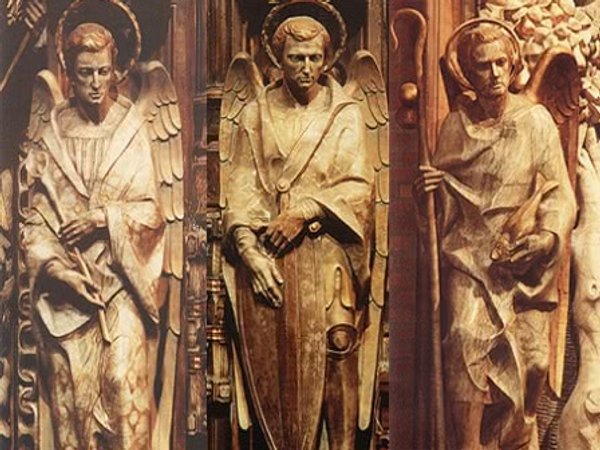On Thursday, October 6, 1932, while St Josemaria Escriva was praying in the chapel of Saint John of the Cross during his retreat at the Discalced Carmelite monastery in Segovia, he was for the first time inwardly moved to invoke the three archangels and the three apostles Saints Michael, Gabriel, and Raphael, and Saints Peter, Paul, and John. From that moment on he considered them the patrons of the different fields of apostolate that would make up Opus Dei.
Under the patronage of Saint Raphael would be the work of Christian formation of young people.
The founder would place the people in Opus Dei who had received a vocation to celibacy in the middle of the world, under the patronage of Saint Michael and Saint Peter.

Married people who belonged to Opus Dei or took part in its apostolate, would have Saint Gabriel as their patron.
All the future activities of Opus Dei would fit into one of these three categories, which Escriva would call the Work of Saint Raphael, the Work of Saint Michael, and the Work of Saint Gabriel. He had been thinking of founding an association of young people, but had concluded that it would be better not to form any association but simply to give formation to young people – perhaps through an academy like the Cicuendez Academy, where Escriva was teaching. During the retreat, he reaffirmed this conviction.
Opus Dei’s apostolates were made up of people of different walks of life, with different jobs, ages, and other personal circumstances. Between these people and the Work there was no juridical bond, but simply obligations of service and fidelity undertaken freely and willingly within the framework of a generous response to a divine vocation. Within that “disorganization”, the apostolic tasks were organized under the patronage of the three archangels and had the internal cohesion of the spirit of the Work, whose essence consists of the sanctification of ordinary daily work, and apostolate carried out in and through that work.
Adapted from: J. Coverdale, Uncommon Faith: the Early Years of Opus Dei 1928-1943, New York: Scepter, 2002, pp. 116-117; A. Vazquez de Prada, The Founder of Opus Dei, vol. 1, New York: Scepter, 2001, pp. 366-367 and p. 377.
Additional resources
- Meditation for the feast of the Holy Archangels
- Questions about the Faith: What is an angel?
- Pope Francis on the feast of the archangels (2017)
